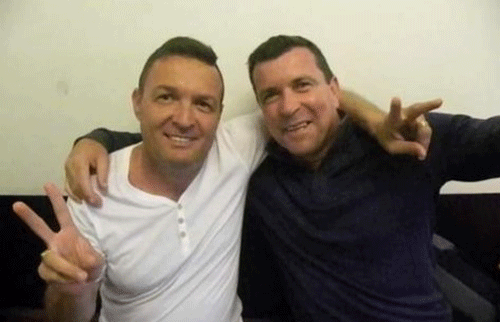When Namibia’s founding president Sam Nujoma, the first democratically elected leader of the Republic of Namibia, penned his autobiography; ‘Where others Wavered’, the veteran freedom fighter must have had Sandro de Gouveia, in mind.
The flying winger-cum-midfielder made waves during an illustrious playing career, consistently fashioning breath-taking performances that announced him as a potential superstar early in his playing days.
Without a shadow of doubt, De Gouveia was one of the greatest footballers ever to emerge from the coastal harbour town of Walvis Bay, pre-and-post-independence.
His arrival on the big stage coincided with Namibia’s admission to the Fifa family after years of exclusion because of apartheid, and while the few selected white players found the going tough travelling all over the continent, getting exposed to the tough and demanding rigours of international football, de Gouveia remained steadfast and weathered the storm.
New Era Sport caught up with the much-travelled former Brave Warriors skipper, who played his club football for boyhood team Sparta United, Vasco Da Gama, Cape Technikon, Blue Waters and Maritimo, as he relives some of his magical moments in the game.
Unlike many of his peers who made their senior debut with their respective boyhood teams, young Sandro de Gouveia, only rose to prominence when he joined the star-studded Cape Technikon team in Cape Town, as a teenager.
Although he has represented South West Africa (SWA) at all junior levels up to the U/20 age group with distinction, De Gouveia never really tasted serious topflight club football on home soil in the early stages of an otherwise blossoming football career.
He later joined professional outfit Vasco Da Gama, where he effortlessly pulled the strings in the middle of the park for the exciting Portuguese outfit under the stewardship of former Kaizer Chiefs attacking midfielder Sergio Dos Santos, before he joined South African Professional League outfit Cape Town Spurs in July 1990.
Some of his celebrated teammates at the Cape Technikon were; Graig le Grange, Mike Brown, Derick Glasgow, Johnny da Sousa, Pepe Dos Santos jr, Peter Wainright, Mike Sank, Mike Gleeson, Robbie Sevenoaks and Rudi Pahl.
His exploits did not go unnoticed as the flying winger was deservedly selected to represent the South African Combined Defence Force team in the prestigious annual South African Inter-Provincial Currie Cup, in East London in 1989.
His impressive performance during the tourney earned him Springbok colours to join the quartet of Hasso Ahrens, Gunter Hellinhghausen, Siegfried ‘Dale’ Stephanus and Ben ‘Kleintjie’ Gaseb as the only Namibians to earn Springbok colours in the football discipline during the dark days of the South African apartheid regime.
Interestingly and unbeknown to many, elder brothers Ivo and Luis also featured in the same tournament for South West Africa/Namibia. Professional outfit Cape Town Spurs came knocking on his door for his signature.
Regrettably, the new kid on the block’s lodging at Spurs only lasted a month after he sustained a career threatening injury in a horrific car accident that laid him down with a broken right femur, obligating medical experts to insert a huge pit in his leg.
“Eish…I was out of action for about two years and honestly thought I will never play football again but once they removed the pin, I was able to play,” recalls De Gouveia with a huge sigh of relief.
Upon his recovery, the versatile silky midfielder returned home and joined forces with newly formed Portuguese outfit Maritimo, successor to Sparta United in the Amateur Soccer League (ASA), under the auspices of SWAFA.
However, his lodging at Maritimo came to an abrupt end when the league was dismantled to make way for the Namibia Premier League (NPL) when the country gained its eagerly-awaited independence in 1990.
The much-adored midfielder joined the more glamorous cross town outfit Blue Waters, following in the footsteps of elder brother Ivo, who at some stage also played for Waters. He flourished under astute Zimbabwean mentor Shepherd Murape, who duly rewarded the skilful playmaker with the captain armband, a task he duly accepted to lead Waters to the promised land. He grabbed the challenge with both hands and propelled Waters to the coveted national league title in 1996, followed by a gold medal in the BP Top 8 Cup, the same year. It was not long before national selectors recognised his immense talent, De Gouveia was called up to the Brave Warriors squad and never looked back ever since. He made his debut as a second half substitute against Madagascar and also featured in the 4-0 home defeat at the hands of the rampant Chipolopolo of Zambia in 1992.
Sadly, he got badly injured after he was accidentally booted in the face by goalkeeper Sparks Gottlieb, thus missing further action in the group qualifiers. Nonetheless, De Gouveia eventually clocked a total of 20 caps under his radar on the international stage. He scored his first and only international goal in the 4-1 hammering of Malawi at the Windhoek Independence stadium.
De Gouveia played an instrumental role when the Warriors reached two Cosafa Cup finals in 1997 and 1998, only to stumble at the last hurdle on both occasions.
De Gouveia represented his native land with aplomb in various international assignments, including Namibia’s maiden appearance at the prestigious biannual continental showpiece, the Africa Cup of Nations (Afcon) finals in Burkina Faso in 1998. Unfortunately, he stopped playing competitive football shortly after returning from Burkina Faso because of football politics. The league did not resume as a result of a dispute in the aftermath of Eleven Arrows’ relegation from the country’s flagship league.
Warmly loved and well respected by football fans and teammates alike, De Gouveia will go down in history as one of the most adored footballers of all time. He was one of only two athletes of Caucasian descent to wear the Brave Warriors captain armband. The other one was former Ramblers inspirational skipper Rudi Pahl.



